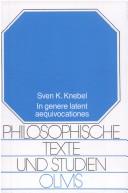| Listing 1 - 2 of 2 |
Sort by
|

ISBN: 3487091534 9783487091532 Year: 1989 Volume: 20 Publisher: Hildesheim Olms
Abstract | Keywords | Export | Availability | Bookmark
 Loading...
Loading...Choose an application
- Reference Manager
- EndNote
- RefWorks (Direct export to RefWorks)
Semantics (Philosophy) --- Universals (Philosophy) --- Philosophy, Ancient --- Philosophy, Medieval --- Sémantique (Philosophie) --- Universaux --- Philosophie ancienne --- Philosophie médiévale --- History --- Histoire --- Philosophy, Greek. --- Philosophy. Medieval. --- History. --- Philosophy, Greek --- Philosophy. Medieval --- -Intension (Philosophy) --- Logical semantics --- Semantics (Logic) --- Semeiotics --- Significs --- Syntactics --- Unified science --- Language and languages --- Logic, Symbolic and mathematical --- Logical positivism --- Meaning (Psychology) --- Philosophy, Modern --- Semiotics --- Signs and symbols --- Symbolism --- Analysis (Philosophy) --- Definition (Philosophy) --- Medieval philosophy --- Scholasticism --- Ancient philosophy --- Greek philosophy --- Philosophy, Roman --- Roman philosophy --- -History --- Sémantique (Philosophie) --- Philosophie médiévale --- Intension (Philosophy) --- Semantics (Philosophy) - History.
Book
ISBN: 9789027260079 Year: 2021 Publisher: Amsterdam/Philadelphia John Benjamins
Abstract | Keywords | Export | Availability | Bookmark
 Loading...
Loading...Choose an application
- Reference Manager
- EndNote
- RefWorks (Direct export to RefWorks)
"Molinism, formerly an invective, is nowadays a topic of philosophy. This book, however, does not deal with the modern renaissance of Middle Knowledge, rather, it explores its proliferation during the 17th and 18th centuries. The focus shifts from reviewing current trends in Church History to rehearsing the metaphysics that backed up Middle Knowledge. Fact, in Molinism, is threefold: It could have been otherwise, it belongs to some possible world, it is necessarily known by the Omniscient. Whereas the classical account of God's foreknowledge rests on its being postvolitional, the Molinist qualification of this account denies that it applies to the counterfactuals. On what else then does it prevolitionally depend that God knows for sure something to happen rather than not to happen? The Salmantine Treatise on God's foreknowledge edited here provides some additional piece of evidence of a deep Molinist disagreement. Though the manuscript was ready for print in 1653, this business failed and the manuscript fell into oblivion along with its author. The Jesuit Luke Wadding (1593-1651) belongs to a number of men from Waterford who at a time, when intolerance forced Catholics into large scale emigration, hopefully turned towards Spain. He must not be confounded with his famous namesake, the Franciscan friar, who was his cousin"--
God --- Free will and determinism. --- Molinism. --- Contingency (Philosophy) --- Omniscience. --- Wadding, Luke, --- Biblioteca Universitaria de Salamanca. --- Philosophy --- Free will and determinism --- Grace (Theology) --- Compatibilism --- Determinism and free will --- Determinism and indeterminism --- Free agency --- Freedom and determinism --- Freedom of the will --- Indeterminism --- Liberty of the will --- Determinism (Philosophy) --- Knowledge of God (Omniscience of God) --- Omniscience (Theory of knowledge) --- Religious aspects --- Catholic Church --- Knowledge (Omniscience) --- Attributes
| Listing 1 - 2 of 2 |
Sort by
|

 Search
Search Feedback
Feedback About UniCat
About UniCat  Help
Help News
News